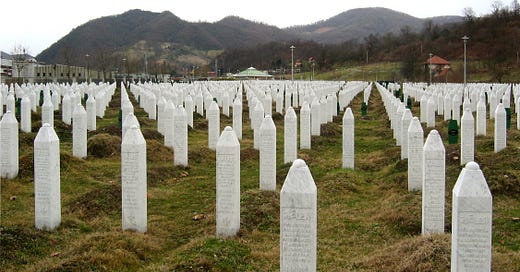What’s in a name? That which we call a rose
By any other name would smell as sweet;
It was clear to Shakespeare that if a flower stinks, calling it a rose would not change the smell.
There is a kind of intellectual cowardice masquerading today as moral righteousness. It hides behind words that are designed not to clarify, but to intimidate. Genocide has become such a word — less a description of reality than a tool of political coercion.
What is happening in Gaza is tragic and complex. It deserves sober analysis, not moral histrionics. Yet much of the public discourse proceeds in exactly the opposite direction: facts are declared irrelevant, nuance is dismissed as complicity, and judgment is rendered not through deliberation but by invocation of a word so charged that it shuts down inquiry before it can begin.
The Politics of the Shortcut
At its core, this is not a debate about the reality in Gaza. It is a debate about how reality itself is to be approached. In the world of reason, one begins with facts — casualties, combatants, intentions, legal definitions — and works toward moral evaluation. But in the world of propaganda, the process is inverted: first comes the label, then all facts are marshaled — or ignored — to sustain it.
The purpose of labeling Israel’s actions as genocide is not to advance understanding but to short-circuit it. Genocide is a term that carries with it the full moral weight of the Holocaust — the crematoria, the mass graves, the mechanized extermination of a people. The analogy is intended to be automatic: as Hitler was evil, so too must Israel be. The emotional force of the word does all the argumentative labor. No evidence, context, or complexity is required.
This is not moral clarity; it is moral blackmail. It offers the intoxicating simplicity of absolute judgment without the burden of serious inquiry.
The Function of the “Denier”
The tactic gains further force through its pairing with another loaded term: denier. Originally reserved for those who engaged in the monstrous revisionism of Holocaust denial, the term has now been promiscuously applied to any who resist the approved narrative. There are climate change deniers, vaccine deniers, election deniers, and now genocide deniers. The function is the same: to excommunicate dissenters from polite society by associating them with historical evil.
Once someone has been branded a denier, dialogue is no longer possible. The term relieves its users of the responsibility to engage opposing arguments. One does not debate with deniers; one condemns them.
The grotesque irony is that many of those now so eager to wield the language of genocide are the very people who, when it suited their ideological commitments, spent years minimizing or relativizing the unique horror of the Holocaust itself. But now that the term serves a different political purpose — to delegitimize the state of Israel — it is suddenly indispensable.
Moral Panic as Political Instrument
The public mob that now scours social and professional spaces for "genocide deniers" operates with the same zeal as the inquisitors of old. It is not content to disagree; it must destroy reputations, silence dissent, and purge the impure from public life. As in all moral panics, the true objective is not justice but ideological conformity.
The mob’s psychology is depressingly familiar. Many who join it do so not because they have carefully examined the facts, but because they seek the cheap solidarity that comes from aligning with what appears to be the morally fashionable side. It is easier to shout genocide than to think through the messy realities of asymmetrical warfare, terrorist provocation, and the tragic dilemmas faced by democratic states defending themselves against enemies who embed themselves among civilians.
Indeed, to acknowledge complexity is itself now suspect — a sign of insufficient moral urgency. The only safe posture is absolute certainty. And that certainty is delivered, as always, by the label.
The Corruption of Language and the Collapse of Thought
This collapse of thought into language is not a new phenomenon. Orwell warned of it decades ago, writing that "political language is designed to make lies sound truthful and murder respectable, and to give an appearance of solidity to pure wind." What we are witnessing is precisely that dynamic: the replacement of serious moral reasoning with an arsenal of emotionally loaded vocabulary, deployed not to enlighten but to shame and silence.
Reality, however, remains indifferent to our slogans. Whether one calls it genocide or not, the facts on the ground in Gaza remain what they are. There are civilians and combatants; there is Hamas’ long-standing strategy of using civilians as shields; there are tragic deaths; there are acts of defense and acts of aggression. These are the raw materials of moral judgment. To shortcut that process with a word is not to clarify but to abdicate moral responsibility.
The Obligation to Resist
In such an environment, the first duty of the intellectually honest person is to resist the tyranny of labels. It is not an act of moral indifference to reject the term genocide where it does not apply; it is an act of moral seriousness. Labels must follow facts, not precede them.
To discard these verbal weapons is not to surrender one’s conscience. It is, in fact, the only way to preserve it. The temptation to replace thought with moral grandstanding is always great, particularly in an age addicted to performance over substance. But civilization depends on those who are willing to resist that temptation.
In times of hysteria, sanity itself becomes a form of dissent.
The text is based on my comment of Slovenian hysteria over former president Borut Pahor’s “failure” to call events in Gaza genocide; after the current president Nataša Pirc Musar, for example, lead the charge with the term in the European Parliament.




